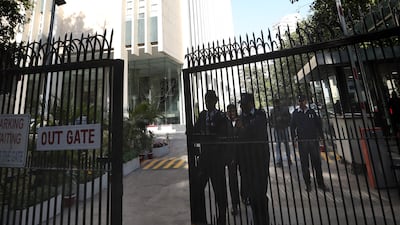The BBC has said that it will continue to “report without fear or favour” after a three-day search of its offices in New Delhi and Mumbai by tax officials.
The searches come weeks after the UK broadcaster released a documentary critical of Prime Minister Narendra Modi.
The BBC said in a Twitter post late on Thursday that the income tax officials had “left the offices” after a raid that lasted 60 hours, and that it would continue to co-operate with the authorities to resolve the matter “as soon as possible”.
It said it would prioritise supporting its staff, "some of whom have faced lengthy questioning or been required to stay overnight" since the raid began on Tuesday morning.
"Our output is back to normal and we remain committed to serving our audiences in India and beyond,” the broadcaster said.
"The BBC is a trusted, independent media organisation and we stand by our colleagues and journalists who will continue to report without fear or favour."
A team of 15 officials arrived at the BBC offices near Connaught Place, the British-era main commercial hub in New Delhi, at around 11.30am on Tuesday.
They also raided the BBC’s two offices in Mumbai.
The officials said they were conducting a" survey" related to alleged tax evasion.
No one was allowed to enter or leave the 18-storey office complex in Delhi. The staff were asked to stay inside and their phones were seized, an employee told The National.
While most of the employees were asked to work from home on the second day of the raid, some were asked to be “available” and questioned overnight.
The investigation came weeks after the government blocked the airing of the two-part BBC documentary titled India: The Modi Question.
The documentary questioned Mr Modi's leadership during the deadly 2002 Gujarat riots, when he was the chief minister of the western state.
While the BBC did not air the two-part documentary in India, it was available to view online including on YouTube.
Mr Modi’s government immediately denounced the documentary as "propaganda" and banned its circulation online, using emergency powers available under information technology rules. It ordered Twitter to block more than 50 tweets with links to the documentary and told YouTube to block viewing of the show.

The raid sparked criticism from opposition leaders, journalists and press associations and human rights activists.
The Editors Guild of India said that it was “distressed by the continuing trend of government agencies being used to intimidate and harass news organisations that are critical of the ruling establishment".
Mr Modi's Bharatiya Janata Party justified the raids by claiming that the BBC was carrying out a “divisive agenda” in the country.
Calling it the “world’s most corrupt organisation”, BJP spokesman Gaurav Bhatia said that the BBC was indulging in anti-Modi propaganda and trying to attack the sovereignty of the country.

